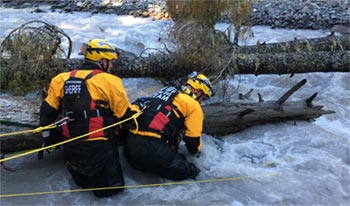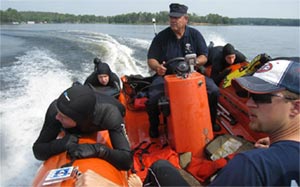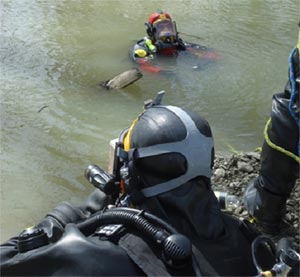Contact Us
To provide feedback on the Community Policing Dispatch, e-mail the editorial board at CPDispatch@usdoj.gov.
To obtain details on COPS Office programs, publications, and resources, contact the COPS Office Response Center at 800-421-6770 or AskCopsRC@usdoj.gov

U.S. Department of Justice
Office of Community Oriented Policing Services
Washington, DC 20530
 Accidents, crime, and terrorism don’t stop at the water’s edge. Vehicles go off the road and people fall off docks. Criminals hide evidence, stolen cars, illegal drugs, weapons, and even victims under the water.
Accidents, crime, and terrorism don’t stop at the water’s edge. Vehicles go off the road and people fall off docks. Criminals hide evidence, stolen cars, illegal drugs, weapons, and even victims under the water.
As a result, many agencies near the water have marine units with dive or underwater search and recovery teams. In large cities and ports, the divers may be full-time or marine unit officers who work under the authority of municipal, county, state, or federal agencies, often teamed with fire, rescue, and emergency medical services.
In smaller departments, dive teams are usually staffed by civilians or volunteer officers from other units, or are joint operations in their state or county. In addition to sharing personnel and resources with other agencies and emergency responders, these teams often work together to provide regional service.
Collaborative Missions and Volunteer Divers
Dive Unit Operations
- Search and rescue
- Evidence collection
- Flood operations,
- Current diving
- Hull/pier sweeps
- Swift water
- Salvage/lift operations
- Hazmat diving
- Sonar operations
- ROV operations
- Ice operations
One example of a county-wide joint operation is the Pierce County Metro Dive Team of Tacoma, Washington. A collaborative operation comprising members of the Pierce County Sheriff’s Department, the Tacoma Police Department, and the nearby Lakewood Police Department, all of the divers serve on a voluntary basis as an extra duty assignment.
They are trained in a wide range of diving activities, including hull/pier sweeps, salvage ops, hazmat handling, sonar, evidence collection, body recoveries, and ice operations. All dive team members are also trained for swift water operations.
According to Dive Team Commander Micah Lundborg, the sheriff's department has also trained firefighters, search and rescue personnel, and other volunteers to the same standard as its own deputies. So when a call goes out for a swift water rescue, the response team includes those personnel as well as the dive team, along with search and rescue coordinators, and boat operators.
In other states, police departments and sheriff’s offices without their own units may rely on services such as the Maryland State Police Underwater Recovery Team (MSP URT), which assists local law enforcement with services such as evidence collection, security perimeter scans, and body recovery. Police departments in Texas can train their own people with the help of the Dallas Underwater Recovery Team (DURT).
Black, Cold Water Conditions
Public safety and police divers work in hazardous environments, often at night with little to no visibility and frigid conditions. Their dive locations can run the gamut from oceans to sewers.
Says Lundborg, “It takes a certain mindset. And even those who can dive recreationally may not be able to work in this environment because of physical and mental limitations.” His agency requires annual physicals with chest x-rays, and all divers must meet the requirements of the International Association of Dive Rescue Specialists guidelines.
Training Resources
What It Takes
In addition to diving basics, public safety divers get specialized training for hazards, risk assessment, dive planning, search procedures and techniques, diving in zero visibility, using metal detectors, sonar, full-face masks, communication systems, surface-supplied air, dry suits, lift bags, decontamination and more. Law enforcement divers must also learn how to recover and handle evidence so that it can be presented in court and supported by their testimony.
Many agencies rely on volunteer Public Safety Divers (PSD) who are trained for hazards and zero-visibility conditions, though not necessarily versed in law enforcement protocols for evidence collection. Other agencies may rely on their own people who are open water certified, but don’t have zero-visibility experience.
Law enforcement divers can get PSD training through organizations such as the National Academy of Police Diving (NAPD). Formed in 1988 by a group of police divers to create a national standard for police and public safety diver training and certification, the NAPD trains divers in basic skills as well as areas such as crime scene photography, recovery techniques, and dive scene management.
According to Jordan Harvell, Executive Director of the NAPD, agencies often come to organizations such as his for training because they don’t have teaching experience and want to prevent deaths or injuries due to inadequate training.
Though the way the NAPD works with different departments varies according to need, their instructors always train on site in the agency’s own unique water environment. “You have to train and test divers in situations like those they will work in. NAPD tests them in their environment in zero visibility.”
Making the Case for a Team
Though agencies may see the need, making a good case for starting a dive team is important. According to Harvell, a motivation for some agencies near water is the legal challenges they can face if they don’t have the ability to respond to incidents with search and recovery capabilities.
 “But the best way to sell it to management is to promote it as a rescue team, even though the most common operation is salvaging cars accidentally or deliberately submerged. Most importantly, these teams are essential to finding evidence no other unit can.”
“But the best way to sell it to management is to promote it as a rescue team, even though the most common operation is salvaging cars accidentally or deliberately submerged. Most importantly, these teams are essential to finding evidence no other unit can.”
“For instance, while working a case searching for a gun used in a homicide, I found just the barrel in the mud. But that was enough for the crime lab, which confirmed through ballistics that it came from the gun used in the shooting.”
Says Lundborg, “You never know what you’re going to find under the water. About 20 years ago, before my time, one of our divers found a bucket full of concrete which he thought was an anchor—but there was a head inside.”
Funding Sources
Though dive teams perform a very valuable service, the cost can be a challenge in small municipalities. According to Commander Lundborg, “It’s a low frequency response team with a lot of risk, and you can run into problems in terms of liability. Training is key to avoiding that and keeping people safe. Your equipment must be good too, and all of this can be expensive. “
 Says Jordan Harvell, “Often, the police see a need for divers, but administration can’t justify the expense. However, you don’t need a huge team. Miami-Dade has run their department with just five or six people for 20 years and they respond to more calls than other divers in the country.”
Says Jordan Harvell, “Often, the police see a need for divers, but administration can’t justify the expense. However, you don’t need a huge team. Miami-Dade has run their department with just five or six people for 20 years and they respond to more calls than other divers in the country.”
To bring costs down, some agencies rely on volunteer teams, contract services out, or develop joint teams with other agencies. If the team is working on navigable waterways or ports, the agency may also be able to get federal grant money for national security services, such as conducting pier and port sweeps for explosives.
Community fund raising efforts can be very helpful, and grants from companies such as Walmart and Costco are also available. Dive Rescue International has a list of possible funding sources on their web site. To keep expenses down, an agency can sometimes find discounts from equipment manufacturers and purchase surplus or used equipment.
A Critical Year Round Detail
But even given the challenges, dive units will continue to be an essential component of many agencies. Drivers will continue to forget to set parking brakes on ferries, criminals will toss guns off bridges, cell phones will fall overboard, skaters will go through the ice, and selfie-taking tourists will take one step too many on docks. And these divers will be there in all weather and conditions to find, rescue, and collect them.
Faye Elkins
Sr. Technical Writer
Subscribe to Email Updates
To sign up for monthly updates or to access your subscriber preferences, please enter your email address in the Subscribe box.






